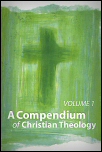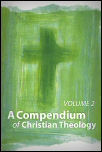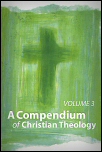Compendium of Christian Theology, 2nd ed. (3 vols.)
Digital Logos Edition
Overview
William Burt Pope’s 3-volume Compendium of Christian Theology is an authoritative textbook on dogmatic theology in the Wesleyan tradition. Published in 1877–1879, this expanded edition quickly became most important and influential Methodist systematic theology of its time, and the clearest representation of Methodist theology during the second half of the nineteenth century.
In these volumes, Pope confronts advances in science, philosophy, literature, and learning. He addresses new developments in the Church, such as theological liberalism, rationalism, and events such as the First Vatican Council. Volume one outlines the divine rule of faith—discussing reason, revelation, miracles, prophecy, and the inspiration and canonicity of Scripture. Volume two discusses sin, including original sin and the manifestation of sin. He also outlines Christ’s redemptive work, with a lengthy discussion of the atonement. The third volume discusses salvation and righteousness, and concludes with a lengthy chapter on eschatology.
As an authoritative and comprehensive systematic theology, these volumes are essential reading for Methodists and Wesleyans, and for anyone interested in nineteenth century systematic theology.
These three volumes will display as a single resource in your digital library.

- Standard theological text in the Wesleyan tradition
- Important discussions of theology in the context of nineteenth century advancements in science and philosophy
- All Scripture references directly linked to the Bibles in your library
Top Highlights
“2. They are sanctified also by the purification from their sin viewed as defilement.” (Volume 3, Page 30)
“The Call is the Proclamation of the redemption accomplished by Christ; the Offer of its blessings on certain conditions; and the Command to submit to the authority of Christ the Mediator of these blessings. These three are one in the embassage of the New Covenant; and the Gospel is not fully preached unless equal prominence is given to all.” (Volume 2, Page 340)
“Our knowledge comes to us through One who is Man and also God; His incarnation in the fulness of time explains the Anthropomorphism of the Old Testament; and it is in Him that the theology of God and the theology of man become one.” (Volume 1, Page 9)
“Those who accept the Divine call through the Word are in the language of Scripture the Elect.” (Volume 2, Page 345)
“The Lord has been pleased to commit His revelation, as finished in the Scriptures, to the keeping of His Church, under the control and supervision of the Holy Spirit. The Scriptures are the rule and standard and test of theology, which in this relation must be regarded as the whole sum of the Church’s Christian literature, gradually produced and variously modified: an extension of the term which is absolutely necessary, but requires to be guarded by the proviso that all sound theology is that which has its foundations and evidences in the Word of God.” (Volume 1, Page 14)
One of the greatest systematic theologies written from a Wesleyan or Arminian perspective.
Destined . . . to hold a distinguished place in the theological literature of England. . . . Marked by the qualities which distinguish Mr. Pope’s other writings. . . . There is the same comprehensiveness of view, the same profound insight into the deep meaning of Holy Scripture, the same intimate acquaintance with all the phase of ancient and modern thought on the great subjects of which he treats, the same devout and reverential regard to Him who is the Centre of all truth, the same fidelity to evangelical doctrine, and the same solicitude for the practical holiness which the truth is designed to nourish and sustain.
—Wesleyan-Methodist Magazine, 1876
Whatever theme comes under Dr. Pope’s treatment, he deals with thoroughly and with masterful grasp. As the modern exponent of Arminian theology, he stands in the front without a comparable rival, and his great work, characterized by so much noble thought and careful inquiry, will doubtless take its place as a standard book of reference and appeal among the systematic expositions of Christian theology, leaving little else for Wesleyan Methodists to require as a manifesto of their creed.
—Literary Intelligence and Review, 1878
- Title: Compendium of Christian Theology, 2nd ed. (3 vols.)
- Publisher: Wesleyan Conference Office
- Author: William Burt Pope
- Volumes: 3
- Pages: 1,400
This title is included in the following collections
You can save when you purchase this product as part of a collection.
Logos 7 Methodist & Wesleyan S...
$39.99$39.99Logos 6 Methodist & Wesleyan S...
$39.99$39.99Logos 7 Methodist & Wesleyan B...
$89.99$89.99Logos 6 Bronze Legacy Library
$89.99$89.99
- $89.99
- $89.99
- $349.99
- $349.99
- $349.99
- $349.99
- $349.99
- $349.99
- $349.99
- $349.99
- $459.99
- $849.99
- $849.99
- $849.99
- $849.99
- $849.99
- $849.99
- $849.99
- $1,499.99
- $1,499.99
- $1,499.99
- $1,499.99
- $1,499.99
- $1,499.99
- $1,499.99
- $3,953.40$2,370.99
- $5,017.57$2,999.99
- $2,999.99
- $2,999.99
- $2,999.99
- $2,999.99
- $4,749.99
- $4,749.99
- $4,749.99
- $10,417.33$6,249.99
- $11,399.99
- $11,399.99
- $21,749.99
- $24,999.99


Reviews
7 ratings

Larry Proffitt (I
11/19/2013

Bill Shewmaker
10/8/2013
James Whited
8/10/2013

RevSarge
8/5/2013

Doug
7/27/2013


Floyd Johnson
12/24/2012
An older, but well-written theological text. Though other theologians approach Wesleyan theology from a philosophical or descriptive perspective, this author had done a wonderful job of supporting the Wesleyan-Arminian position from a Biblical perspective.
